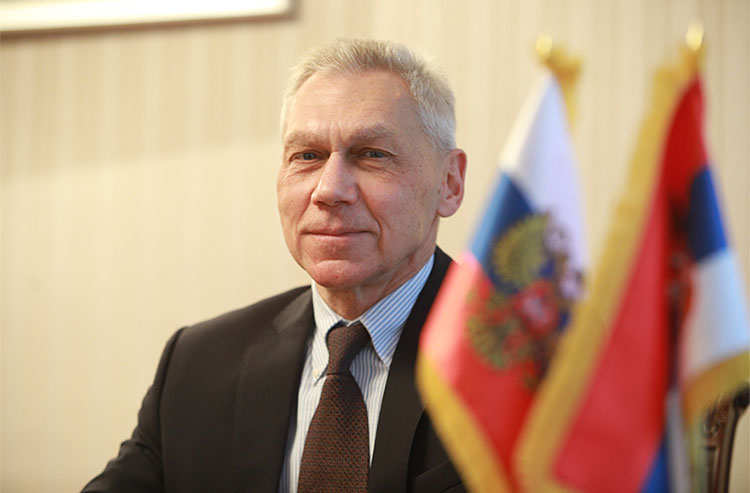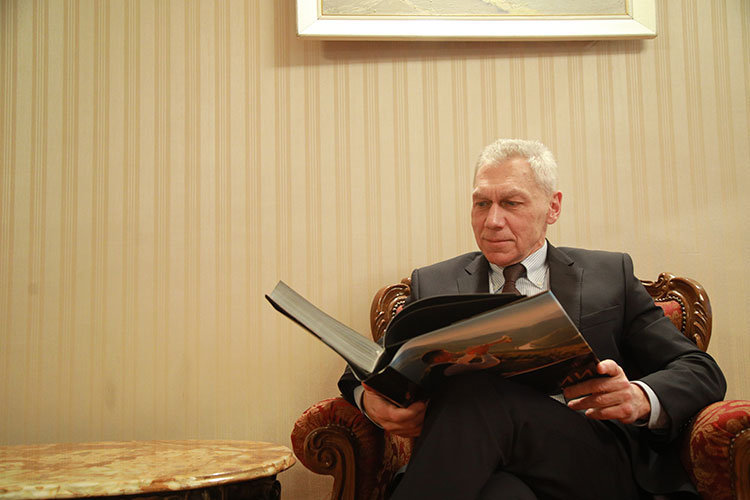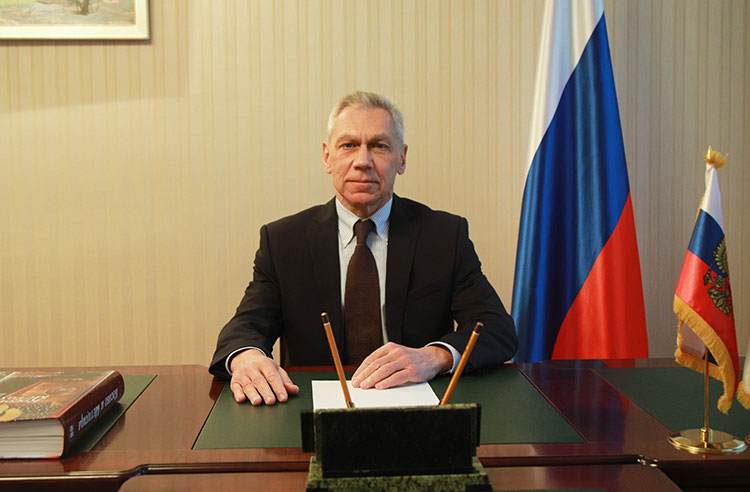One does not need a chemist’s scales to understand that it was not the Bosnian-Serbs leadership that sparked the crisis situation in Bosnia-Herzegovina, much less Serbia or Russia, but above all those international officials who by their very definition should have been responsible for overcoming existing problems ~ Alexander Botsan-Kharchenko
Dismissing accusations that Russia and Serbia, with the support of the Serbian member of the B-H presidency, have contributed to the institutional crisis in that country, Russian Ambassador Alexander Botsan- Kharchenko reiterates in this interview for CorD Magazine that the time has come for dialogue to be led by the representatives of the three peoples of Bosnia-Herzegovina, while the Office of the High representative should be closed.
Your Excellency, how would you evaluate the recent meeting between the presidents of the Russian Federation and Serbia in Sochi?
The summit in Sochi on 25th November took place in a traditionally friendly and trust-based atmosphere. Russian President Vladimir Putin and Serbian President Aleksandar Vučić thoroughly discussed a wide range of issues of mutual interest. The Russian side reaffirmed its principled support of Belgrade’s position on the Kosovo settlement. We consistently stand for the elaboration of a viable compromise solution in the dialogue between Belgrade and Priština on a solid foundation of international law and UN Security Council Resolution 1244.
The leaders made arrangements regarding a variety of important matters, as well as outlining plans for new joint projects in the spheres of construction and the large-scale modernisation of energy and transport infrastructure, science and technology cooperation, cultural exchanges, increasing media presence.
As a follow-up, on 10th December the prime ministers of the two countries, Mikhail Mishustin and Ana Brnabić, conducted talks in Moscow on the margins of the Made in Russia International Export Forum, where Serbia was a partner country.
Have preparations begun for President Putin’s visit to Serbia, given that it has been announced that he has accepted the invitation to visit our country in May?
Russian President Vladimir Putin has an open invitation to visit Belgrade. The timing and other details are to be confirmed through diplomatic channels. We are grateful to our Serbian friends for their determination to advance our bilateral strategic partnership and creative suggestions on its further development. We fully share this approach.

Following the meeting of the two presidents, it was announced that Serbia will buy Russian gas at a price of 270 dollars per 1,000 cubic metres over the next six months. Some analysts see the preferential price of Russian gas for Serbia as being political and not economic. What would you say to that?
At the summit, it was decided to extend the existing long-term gas supply contract with Serbia for half a year, therefore the price will remain the same for the most challenging winter period. It is expected that, in the meantime, economic operators will reach a constructive and mutually beneficial solution concerning the modalities of further cooperation.
The issue of energy in the EU is a par excellence political issue, as shown by the problems of certifying the Nord Stream 2 pipeline that delivers Russian gas directly to Germany. What will its fate be, given Western comments that Moscow is using the pipeline to strengthen its influence within the EU?
I would rather say that the EU unscrupulously politicises a par excellence commercial issue of energy supply. The risks of such politicisation are substantial. It is the stability and predictability of delivering energy that defines economic resilience, the competitive capacity of enterprises, and the wellbeing of millions of people.
This is clearly understood here, in Belgrade. The new gas transportation system using gas from the TurkStream was launched on 1st January, and in October Serbia became a transit country. The cross-country gas pipeline today contributes to the development of Serbian economic potential and the rise of citizens’ income.
The new gas transportation system using gas from the TurkStream was launched on 1st January, and in October Serbia became a transit country. The cross-country gas pipeline today contributes to the development of Serbian economic potential and the rise of citizens’ income
The earliest possible removal of administrative barriers hindering the launch of the Nord Stream 2 pipeline would have somewhat balanced the situation on the energy markets caused by a series of miscalculations in EU energy policy. The aim of this infrastructure project is to provide uninterrupted delivery of gas to EU consumers. As President Putin has emphasised continually, Russia fully honours its contractual obligations to its European partners, contributing greatly to the improvement of energy and environmental security of the continent.
The renovated railway from Belgrade to Novi Sad should open to traffic in February. The demanding section from Stara Pazova to Novi Sad was built by Russian company RZD International. The Serbian President has proposed that the same company negotiate for work on the construction of the Valjevo-Priboj- Vrbnica railway. Is there any interest in continuing the engagement of Russian companies on railway projects?
Certainly, Russian Railways is ready to participate in the further modernisation of Serbia’s rail infrastructure. A case in point is the Subotica–Horgoš– Hungarian border railway line and the technically complex Valjevo–Vrbnica–Montenegrin border railway line, as well as construction of the Integrated Traffic Control Centre, which is set to become the most advanced in the region. By the way, it will employ graduates of the Education Centre opened by this Russian company in 2020. Another notable project could be the construction of a new system of urban and suburban railways – the so-called Belgrade Diameters – in Serbia’s capital, modelled on a similar successful project in Moscow.

The authorities in Belgrade regularly update you on the status of the dialogue with Priština, which has again reached a kind of stalemate. Do you believe that in the existing format – under the patronage of the EU and with the participation of Miroslav Lajčak – this process can be unblocked in the direction of creating the Community of Serbian Municipalities?
We highly appreciate the exchanging of views with our partners in Belgrade on the Kosovo settlement and all aspects of the situation in the Serbian Autonomous Province of Kosovo and Metohija. We agree that the reason for the stalled dialogue between Belgrade and Priština is the unwillingness of the Provisional Institutions of Self-Government in Kosovo to hold serious talks. We proceed from the premise that the Brussels dialogue, organised in accordance with the UN General Assembly Resolution, hasn’t fulfilled its potential. What is important is that the EU facilitators and other interested parties should underline that the Kosovo Albanian leaders must meet their earlier obligations, primarily those concerning the establishment of the Community of Serbian Municipalities in Kosovo. Disregarding this obligation harms Priština itself, and we expect it to understand that fact as soon as possible.
A section of the media commented on your presence at the facilities of the Serbian Army near the administrative border with Kosovo during the crisis that hit Serbian garrisons in September 2021. What was the reason for that visit and how did you view the actions of Kosovo special units in the north of the province?
That visit to the garrisons was conducted by invitation of the Serbian side, within the framework of our intensive defence cooperation with Belgrade. There is no hidden agenda: we intend to further assist in the modernisation of Serbian Armed Forces, execute joint exercises and other activities aimed at improving Serbian capacities to counter any threats to its security.
As for Priština’s attempts to destabilise the situation, including through raids of local police special forces in northern Kosovo, considerable post-conflict experience clearly indicates that such short-sighted moves only generate more tension. We regret that those who make such decisions do not consider their possible grave implications. For instance, in October, Pristina’s security forces used firearms, and it was only pure luck that no one was killed. We urge Priština to cease its irresponsible behaviour and resume normal dialogue with Belgrade.
Does the recent decision on the lifting of border controls between Albania and Kosovo destabilise the region or contribute to strengthening regional cooperation?
We are sure that any steps that violate Serbian sovereignty and territorial integrity, and that exceed the powers of the Provisional Institutions of Self-Government in Kosovo set forth in UN SC Resolution 1244, are extremely malicious and dangerous. This is especially true given that there are regional mechanisms that enable cooperation to be promoted while fully acknowledging Belgrade’s legal rights. Without it, the activities of Tirana and Priština only heighten concerns about the Greater Albania plans that are damaging to the region, let alone about the risks of the uncontrolled spill-over of terrorism, smuggling and human trafficking. We suppose close attention should be paid to this topic, including at the next UN SC meeting on situation in Kosovo and Metohija.
The earliest possible removal of administrative barriers hindering the launch of the Nord Stream 2 pipeline would have somewhat balanced the situation on the energy markets caused by a series of miscalculations in EU energy policy
You are very well acquainted with the situation in Bosnia-Herzegovina. How would you comment on the voices emanating from Sarajevo that accuse Russia and Serbia of causing the country’s latest institutional crisis by supporting the Serb member of the presidency, Milorad Dodik?
One does not need chemist’s scales to understand that it was not the Bosnian Serb leadership that sparked the crisis situation in Bosnia-Herzegovina, much less Serbia or Russia, but primarily those international officials who, by their very definition, should have been responsible for overcoming existing problems. It was the High Representative in Bosnia-Herzegovina Valentin Inzko who, before his voluntary resignation, flagrantly interfered in the country’s internal affairs. The situation was seriously exacerbated by the West’s nomination of Christian Schmidt as the next High Representative, without a consensus in the Peace Implementation Council Steering Board, in circumvention of the UN SC, without the approval of all parties in Bosnia-Herzegovina. We suppose that there is only one way to overcome these artificially created challenges: all parties in the country should again engage in a dialogue on how to settle all the problems and differences on their own. This will secure the implementation of the 1995 Dayton Agreement, ensure Bosnia-Herzegovina’s sovereignty and the broad powers of the two entities, as well as the equal rights of the three constituent peoples. The greatest obstacle to tackling the political crisis and stabilising the country is the outdated institution of the High Representative. The most urgent task is to shut it down.

Late 2021 was marked by new tensions flaring between Russia and NATO with regard to Ukraine. Do you believe that, despite harsh words and threats of the use of weapons, disagreements will be resolved through continuing dialogue?
We consider the escalation of confrontation unacceptable and have always advocated the establishment of a serious dialogue with the U.S. and other Western countries on Euro-Atlantic security issues. Such consultations should be based on the principle of equal and indivisible security enshrined, inter alia, in the 1999 Charter of European Security signed by all NATO countries. We plan to soon propose drafts of international legal documents for further negotiation in relevant formats. As President Putin has noted, they envisage the formalising of long-term binding guarantees ruling out the eventuality of NATO’s eastward expansion and deployment of offensive weapons systems alongside Russia’s western border.
Concerning Ukraine, I would underline that Russia is not a party to the intra-Ukrainian conflict. We pursue the full implementation of the 2015 Minsk agreements, to which (as all our partners recognise) there is no alternative. We point out that Kiev, with the acquiescence of the West – just as is the case with Priština and the Brussels agreements – sabotages the fulfilment of earlier obligations and continues dangerous provocations on the line of contact in Donbass.
We maintain close international contacts on the aforementioned issues. Just recently, President Putin held in-depth talks with U.S. President Joe Biden, UK Prime Minister Boris Johnson and French President Emmanuel Macron.
| ENERGY It is the stability and predictability of delivering energy that defines economic resilience, the competitive capacity of enterprises, and the wellbeing of millions of people | KOSOVO DIALOGUE We agree that the reason for the stalled dialogue between Belgrade and Priština is the unwillingness of the Provisional Institutions of Self-Government in Kosovo to hold serious talks | SECURITY We have proposed drafts of international legal documents for further negotiation in relevant formats |
|---|